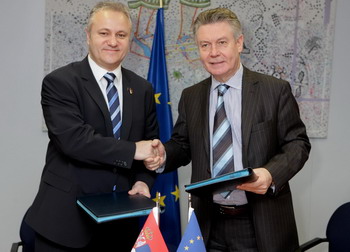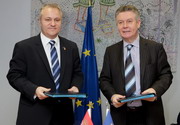- Serbia
Get to know Serbia
- Citizens
Culture and science
Health services
Pension and disability insurance
- Business
Employment
Economy
- Media
- Government
- Contact
Keep in touch
Contact form
Back
Keepin touch
Whether you have a question, comment, suggestion or any problem in the purview of the government, send us your message and we will try to respond as soon as possible. If your problem is not in our purview, we will forward your message to the relevant institution.
Q:
A:
New step for Serbia toward WTO accession
Belgrade/Brussels,
11 January 2011
Deputy Prime Minister and Minister of Economy and Regional Development Mladjan Dinkic and EU Trade Commissioner Karel de Gucht signed today in Brussels a bilateral protocol on the liberalisation of markets for goods and services between Serbia and the EU within the framework of Serbia’s accession to the World Trade Organisation (WTO).
Dinkic said that the signing of this document has brought the most important step in Serbia's accession to the WTO, given the fact that our country exchanges approximately 60% of domestic goods and services with the Union.
In the coming months we will continue negotiations with other WTO members, said the Deputy Prime Minister and expressed his belief that Serbia, after signing an agreement with the EU, will accelerate and successfully complete these negotiations and become a WTO member soon.
He emphasised the importance of WTO membership for Serbia in order to improve trade with the world, adding that today's signing of this bilateral protocol is also a step towards the speeding up of EU accession.
Serbia is still negotiating with the United States, Brazil, Switzerland, El Salvador, as well as with the Ukraine, he said.
Dinkic stressed that the signing of this protocol is important for the further process of the completion of bilateral negotiations with other WTO members, which is a sign that the process of accession to WTO is in its final stage.
Gucht said that Serbia has made great progress in preparing for entry into the WTO and the EU supports Serbia’s rapid accession to the WTO.
Dinkic today in Brussels also met with European Commissioner for Regional Policy Johannes Hahn, who confirmed the EU's support for Serbia in the implementation of the Danube strategy.
The EU budget will allocate ten times more funds for underdeveloped regions, which Serbia should use bearing in mind that the regional differences in Serbia are significantly greater than in other countries.
Bilateral talks on market liberalisation were not conducted directly, as was the case with other WTO members, because Serbia has already signed the Stabilisation and Association Agreement (SAA) and the transitional agreement on trade and trade issues.
The bilateral protocol signed today is based on previously signed agreements regulating all relevant trade issues.
The protocol is very important as it concludes talks with the EU. It is also crucial for the conclusion of bilateral talks with other WTO members, which is a sign that the WTO accession process is in the final stage.
Serbia began the WTO accession process, which requires full alignment of the entire economic system of the country with the rules of this organisation, in February 2005.
WTO membership brings a variety of benefits – predictability and security of the amount of customs duties as well as creating an environment favourable for foreign investors.
WTO controls 80% of world trade, 90% of financial transactions, 92% of telecommunications and information technology and 97% of intellectual property rights.
In the coming months we will continue negotiations with other WTO members, said the Deputy Prime Minister and expressed his belief that Serbia, after signing an agreement with the EU, will accelerate and successfully complete these negotiations and become a WTO member soon.
He emphasised the importance of WTO membership for Serbia in order to improve trade with the world, adding that today's signing of this bilateral protocol is also a step towards the speeding up of EU accession.
Serbia is still negotiating with the United States, Brazil, Switzerland, El Salvador, as well as with the Ukraine, he said.
Dinkic stressed that the signing of this protocol is important for the further process of the completion of bilateral negotiations with other WTO members, which is a sign that the process of accession to WTO is in its final stage.
Gucht said that Serbia has made great progress in preparing for entry into the WTO and the EU supports Serbia’s rapid accession to the WTO.
Dinkic today in Brussels also met with European Commissioner for Regional Policy Johannes Hahn, who confirmed the EU's support for Serbia in the implementation of the Danube strategy.
The EU budget will allocate ten times more funds for underdeveloped regions, which Serbia should use bearing in mind that the regional differences in Serbia are significantly greater than in other countries.
Bilateral talks on market liberalisation were not conducted directly, as was the case with other WTO members, because Serbia has already signed the Stabilisation and Association Agreement (SAA) and the transitional agreement on trade and trade issues.
The bilateral protocol signed today is based on previously signed agreements regulating all relevant trade issues.
The protocol is very important as it concludes talks with the EU. It is also crucial for the conclusion of bilateral talks with other WTO members, which is a sign that the WTO accession process is in the final stage.
Serbia began the WTO accession process, which requires full alignment of the entire economic system of the country with the rules of this organisation, in February 2005.
WTO membership brings a variety of benefits – predictability and security of the amount of customs duties as well as creating an environment favourable for foreign investors.
WTO controls 80% of world trade, 90% of financial transactions, 92% of telecommunications and information technology and 97% of intellectual property rights.
-
 Požega, 5 July 2025
Požega, 5 July 2025Section of Pakovraće - Požega highway officially opened
-
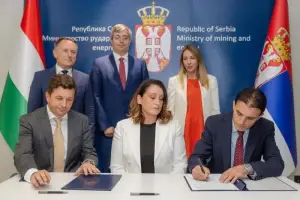 Belgrade, 2 July 2025
Belgrade, 2 July 2025Technical specifications defined for Serbia-Hungary oil pipeline
-
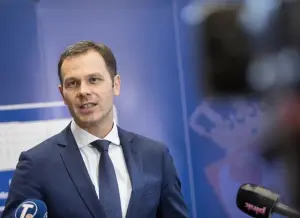 Belgrade, 30 June 2025
Belgrade, 30 June 2025IMF confirms Serbia successfully implementing all agreed reforms
-
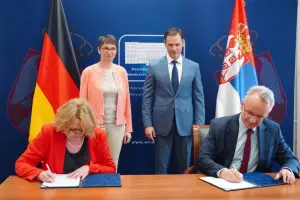 Belgrade, 27 June 2025
Belgrade, 27 June 2025Double Taxation Avoidance Agreement with Germany signed
-
 Kostolac, 25 June 2025
Kostolac, 25 June 2025Construction of Kostolac wind farm nearing completion
-
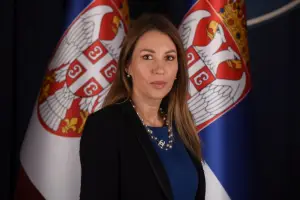 Belgrade, 24 June 2025
Belgrade, 24 June 2025Government supports request for new postponement of sanctions against NIS
-
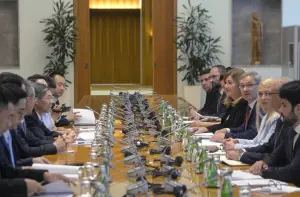 Belgrade, 23 June 2025
Belgrade, 23 June 2025Procedures to facilitate sale of Serbian products to China to be accelerated
-
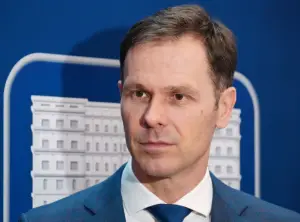 Belgrade, 21 June 2025
Belgrade, 21 June 2025Serbia receives first funds under Growth Plan for the Western Balkans
-
 Belgrade/Cairo, 20 June 2025
Belgrade/Cairo, 20 June 2025New phase in relations with Egypt in field of agriculture
-
 Belgrade/Athens, 18 June 2025
Belgrade/Athens, 18 June 2025Serbia’s leadership position in power sector

